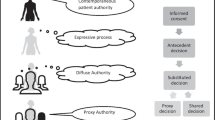Abstract
This paper argues that the concept of best interests in the context of clinical decisions draws on concepts rooted in the philosophical discipline of axiology. Reflection on the philosophical origins enables a distinction to be drawn between those interests related to clinical goals and those global interests that are axiological in nature. The implication of this distinction is most clearly seen in the context of end of life decisions and it is argued here that greater weight ought to be given to the positive requests, and not merely competent refusals, of patients at the end of life.
Similar content being viewed by others
References
Airedale NHS Trust v. Bland. (1993). AC 789.
Boyd, K. M. (2002). Mrs Pretty and Ms B. Journal of Medical Ethics, 28, 211–212.
Brock, D. (1993). Quality of life measures in health care, medical ethics. In M. Nussbaum & A. Sen (Eds.), The quality of life (pp. 95–132). Oxford: Clarendon Press.
Dworkin, R. (1986). Autonomy and the demented self. Milbank Quarterly, 64(Suppl. 2), 4–16.
Dworkin, R. (1993). Life’s dominion: An argument about abortion, euthanasia and individual freedom. New York: Alfred A Knopf.
Evans, S. (2004). Whose life is it anyway? Healthcare news brief. London: Hempsons Solicitors. Autumn: 1.
General Medical Council. (2002). Withholding and withdrawing life-prolonging treatment: Good practice in decision making. London: GMC.
In Re T (Adult: Refusal of treatment). (1993). Fam 95.
Mill, J. S. (1859). On liberty. In M. Warnock (Ed.) (1977), Utilitarianism. Fontana: Glasgow.
Mooney, G. (1994). Key issues in health economics. New York: Harvester Wheatsheaf.
Ms B v. An NHS Hospital Trust. (2002). 2 All ER 449.
Mulhall, S., & Swift, A. (1997). Liberals and communitarians (2nd ed.). Oxford: Blackwell. Publishers Ltd.
Parfit, D. (1991). Reasons and persons (reprint, 1st ed.). Oxford: Clarendon Press.
Pretty v. United Kingdom. (2002). 35 EHRR 1.
R (On the Application of Oliver Leslie Burke) v. The General Medical Council. (2005). EWCA Civ. 1003.
Randall, F., & Downie, R. S. (1999). Palliative care ethics: A companion for all specialties (2nd ed.). Oxford: Oxford University Press.
Re C (Adult: Refusal of Medical Treatment). (1994). 2 FCR 151.
Savulescu, J. (1997). Liberal rationalism and medical decision making. Bioethics, 11(2), 115–129.
Shakespeare, T. W. (2006). Disability rights and wrongs. London: Routledge.
Woods, S. (2005). Respect for persons: Autonomy and palliative care. Medicine Health Care and Philosophy, 8, 243–253.
Woods, S. (2007). Death’s dominion: Ethics at the end of life. Berkshire: Open University Press.
Author information
Authors and Affiliations
Corresponding author
Rights and permissions
About this article
Cite this article
Woods, S. Best Interests: Puzzles and Plausible Solutions at the End of Life. Health Care Anal 16, 279–287 (2008). https://doi.org/10.1007/s10728-008-0083-y
Received:
Accepted:
Published:
Issue Date:
DOI: https://doi.org/10.1007/s10728-008-0083-y




